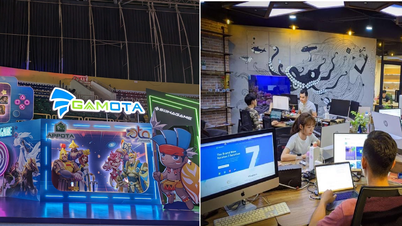Ocelot is a prototype quantum chip that uses "cat" qubits, an advanced technology that significantly reduces the number of physical qubits (the basic computing unit of quantum computers) needed to perform complex calculations. The "cat" qubit, also known as "Schrödinger's cat" qubit, is named after physicist Erwin Schrödinger's thought experiment, which hypothesized a cat that is both dead and alive when locked in a box containing radiation. In physics terms, this is a quantum superposition state, meaning that a quantum system can exist in multiple states simultaneously until it is measured.
Thanks to this “cat” qubit, the Ocelot chip only needs 9 physical qubits to create a “logical” qubit – a qubit that has been error-corrected to serve useful calculations. Meanwhile, traditional methods require about a million physical qubits to create a “logical” qubit.
According to AWS, this technology can help shorten the development process of quantum computers with practical application value by up to 5 years, bringing specific benefits to industries such as pharmaceuticals, finance, materials science , artificial intelligence, etc.
Quantum computers promise to perform calculations that would take millions of years to perform using conventional computers. As such, quantum computers could help scientists accelerate research in areas such as developing new materials such as pharmaceuticals. However, to realize this potential, scientists need to overcome the limitations of errors and the stability of qubits.
Ocelot was announced at the same time that AWS published research in the scientific journal Nature, reflecting important advances in quantum computing. In recent times, many large technology companies such as Google, Microsoft and PsiQuantum have also continuously announced new achievements in this field.
Source: https://baotintuc.vn/khoa-hoc-cong-nghe/amazon-cong-bo-chip-may-tinh-luong-tu-the-he-moi-ocelot-20250227223009931.htm



![[Photo] National Assembly Chairman Tran Thanh Man chairs the 8th Conference of full-time National Assembly deputies](https://vphoto.vietnam.vn/thumb/1200x675/vietnam/resource/IMAGE/2025/9/29/2c21459bc38d44ffaacd679ab9a0477c)
![[Photo] Many streets in Hanoi were flooded due to the effects of storm Bualoi](https://vphoto.vietnam.vn/thumb/1200x675/vietnam/resource/IMAGE/2025/9/29/18b658aa0fa2495c927ade4bbe0096df)

![[Photo] General Secretary To Lam attends the ceremony to celebrate the 80th anniversary of the post and telecommunications sector and the 66th anniversary of the science and technology sector.](https://vphoto.vietnam.vn/thumb/1200x675/vietnam/resource/IMAGE/2025/9/29/8e86b39b8fe44121a2b14a031f4cef46)
![[Photo] General Secretary To Lam receives US Ambassador to Vietnam Marc Knapper](https://vphoto.vietnam.vn/thumb/1200x675/vietnam/resource/IMAGE/2025/9/29/c8fd0761aa184da7814aee57d87c49b3)





























































































Comment (0)